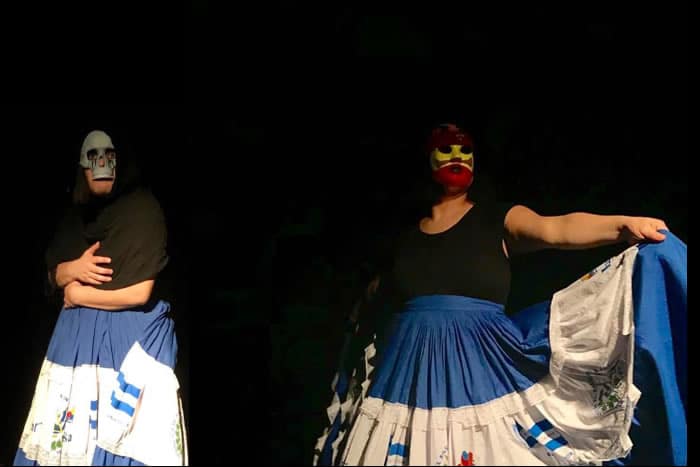This article was first published in DC Theatre Scene here.
“Our work is ceremony, because, to us, art is ceremony,” writes Alexa Elizabeth Rodriguez in her Director’s Note. This is the experience of Siwayul (Heart of a Womxn): the audience is witness to and participant in a ceremony of remembrance and healing. We travel an emotional arc more than an imposed narrative one, moving through sorrow, anger, joy, defiance.
As the stage lights go up, House Manager Kariwase Duprey welcomes us, acknowledges our presence on ancestral Piscataway land, and reads out a list of names: that of every trans womxn known to have been killed in the U.S. and internationally since the last Trans Day of Remembrance in November 2018. Less than five months have passed, and yet as Duprey reads, it seems the list will never end. Such names, if we ever hear of them, are swallowed up by the news cycle in no time flat. This production—this ceremony—rejects that erasure: these women are called in as ancestors, and made present in the play.
Our guide throughout the performance is one womxn, Xemiyulu Manibusan Tapepechul (who goes by Xemi), the playwright and sole actor, playing every character with transfixing range. At the center is Alex, a young Two-Spirit from the country known internationally as El Salvador who is on a journey of self-discovery and self-acceptance. Through Alex, Xemi tells the story of doubled dispossession that many Two-Spirits face: when the spotlight is on trans issues, it usually excludes Indigenous people. When the spotlight is on Indigenous people, it usually excludes trans womxn. Alex jealously watches cis Salvadorans from afar as they access and learn from Indigenous elders, knowing she would not be safe at home; at the same time, she kneels in memorial and mourning of her trans sisters killed in the U.S., knowing her new home is no haven.
If the story Alex has been handed by the binaried, white supremacist world is one of dispossession, this hour-long tour de force is an act of reclamation. After Alex reads off scholarly proclamations about how Náhuat, her ancestral language, is purportedly “dying,” she sits down in defiance to teach herself her tongue. The text available to her, however, cannot be trusted; when it tells her “siwayul,” a compound word meaning “heart of a woman,” refers to a gay man, she questions who the authors empowered to define the word are. We can imagine: they are cis, heteronormative, and embedded in colonial machinery. “It is my living language,” Alex declares, wrapping herself in the word as a trans femme.
As befits a play that deals with the weight of history and the multiplicity of identity, Siwayul: Heart of a Womxn features a range of voices. Behind an array of colorful masks created by Ahanu On, Xemi embodies the ancestors to whom Alex turns for guidance: Siwayul, the Two-Spirit deity; Siwanawal, the skull-masked figure of La Llorona, a folkloric symbol of death, misfortune, and Indigenous oppression; and Nantzin Paula, a poet and musician in the Náhuat language. Xemi’s transformations are completed by simple, effective accessories designed by Angel Garcia.
Siwayul: Heart of a Womxn, now in its third iteration at Capitol Hill Arts Workshop after a 2017 debut at the DC Queer Theatre Festival and a second run last year, is based on Xemi’s first poetry collection, Metzali: Siwayul Shitajkwilu. The play’s language is rich, textured, and intimate. Xemi is an impressive performer, capable of moving seamlessly from Nantzin Paula’s peaceful meditation on communion with the Earth, delivered in a mix of Spanish and Náhuat, to a poem in which Alex, towering above the audience on a pedestal, demands reparations for Two-Spirits directly from the audience.
Xemi’s words disrupt complacency through rage and despair, but also joy and contentment. “The ancestors spoke to me,” Alex cries out early on. “They told me I am beautiful. That I’m exactly who I’m supposed to be.” The play is presented by Nelwat Ishkamewe (meaning Indigenous Root), a Two-Spirit (Native American transgender, intersex, asexual, queer+) collective that Xemi described in a talkback as producing “professional community theater”; she also serves as the group’s Artistic Director. It is rare to see stories centered on the stories of black and brown trans femmes.
What a precious gift to see those stories claim their rightful place in the spotlight, designed and produced at every level by the only people qualified to tell such stories well: the womxn who have lived them.





No Comments